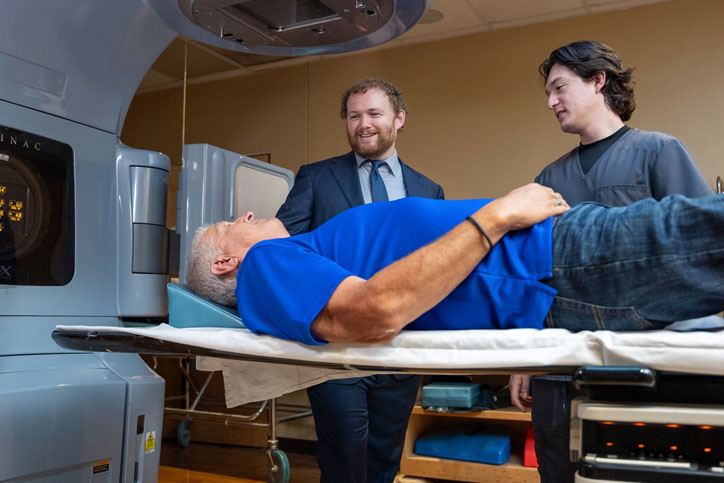Prostate Cancer
CANCER SCREENING
find a clinical trial
GENETIC TESTING

Learn more about our clinical trials currently enrolling cancer patients
Clinical trials
TALK TO ONE OF OUR CANCER CARE SPECIALISTS AT A LOCATION NEAR YOU.
REQUEST AN
APPOINTMENT ONLINE
Prostate cancer is the second most common cancer among men in the US. The good news is it is one of the most survivable forms of cancer.

At Arizona Oncology, our team-oriented approach helps you navigate the ins and outs of your prostate cancer treatment. Whether it’s getting a second opinion or developing a custom care plan, our staff of compassionate oncologists and nurses ensure you remain well informed and comfortable every step of the way.
If you or a loved one has recently been diagnosed with prostate cancer, choose a treatment center that offers leading edge technology, access to clinical trials, and above all a dedication to your unique treatment needs. Choose Arizona Oncology.
Leading Edge Cancer Care
Treatment using leading-edge technology, including genetic testing and personalized therapy. Patients benefit from the expertise of a comprehensive approach including a weekly review board that meets to discuss the best, most individualized treatment option for our patients.
CLINICAL TRIALS FOR PROSTATE CANCER
Access to clinical trials that allow patients the ability to be among the first to benefit from new, and leading-edge therapies.
A DEDICATED AND EXPERT CARE TEAM
Our world class team of nurses and support staff work with you and your oncologists to help ensure the most comprehensive and coordinated care possible.
What are the risk factors of prostate cancer?
There are several factors that may increase a man’s risk of getting prostate cancer.
- Age: Men over the age of 50 have a great chance of being diagnosed with prostate cancer.
- Race: Research shows that prostate cancer is both more common and more aggressive in men of African descent.
- Geography: Prostate cancer is more common in North America, northwestern Europe, Australia, and in the Caribbean Islands.
- Family History: If a family member has been diagnoses with the disease, your risk factor doubles. Some familial genetic mutations such as BRCA1 and BRCA2 can also increase your risk.
- Lifestyle: Certain lifestyle habits such as high saturated fat diets, smoking and obesity can lead to more aggressive prostate cancer
- It’s not only important to know your risk factors, but to also have regular prostate cancer screening when one or more are present.
What are some common signs of prostate cancer?
Here are a few common prostate cancer signs and symptoms:
- Pain or burning while urinating
- Frequent/urgent need to urinate, especially at night
- Difficulty starting urination and/or straining to empty bladder
- Weak, dribbling, or interrupted flow of urine
- Blood in urine or semen
- Painfull ejaculation
- Recent onset or erectile dysfunction
- Discomfort while sitting (caused by enlarged prostate)
- Weakness or numbness in the legs or feet
- Loss of bladder control
- Pain or pressure in the lower back, hips, testicles, rectum or pelvis
Find out more about prostate cancer signs and symptoms and when you should consult a physician.
Prostate cancer testing & diagnosis.
Your doctor can check for prostate cancer before you have any symptoms. During an office visit, your doctor will ask about your personal and family medical history. You’ll have a physical exam. You may also have one or both of the following tests:
Digital rectal exam: Your doctor inserts a lubricated, gloved finger into the rectum and feels your prostate through the rectal wall. Your prostate is checked for hard or lumpy areas.
Blood test for prostate-specific antigen (PSA): A lab checks the level of PSA in your blood sample. The prostate makes PSA. A high PSA level is commonly caused by BPH or prostatitis (inflammation of the prostate). Prostate cancer may also cause a high PSA level. See the NCI fact sheet The Prostate-Specific Antigen (PSA) Test: Questions and Answers.
Prostate cancer staging.
When prostate cancer spreads, it’s often found in nearby lymph nodes. If cancer has reached these nodes, it also may have spread to other lymph nodes, the bones, or other organs.
How is prostate cancer treated?
As with all diseases, your treatment will depend on your personal diagnosis. Common treatment options include active surveillance, surgery, radiation therapy, hormone therapy, and chemotherapy.
Should men with prostate cancer get genetic testing?
Our High Risk Cancer Program is available to our patients to help determine if there is a hereditary link to cancer. Genetic testing can aid in determining treatment options and gives families more data to make informed health decisions.


